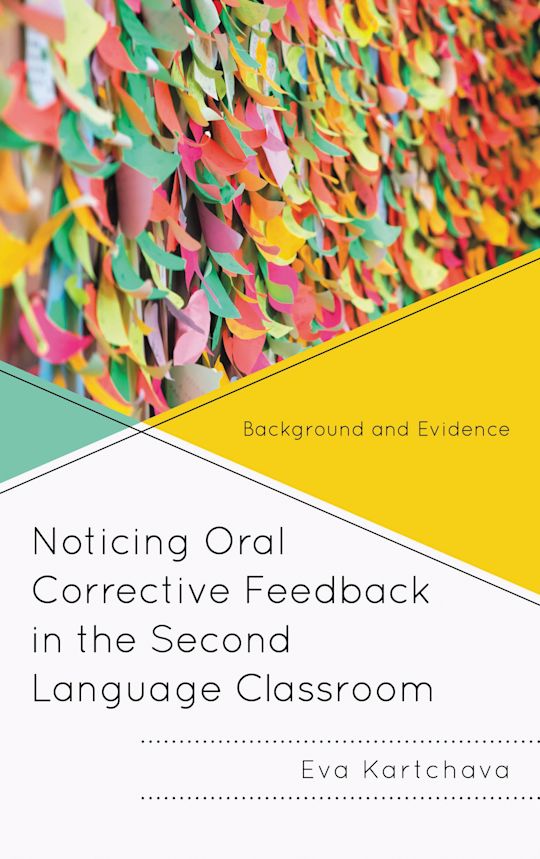- Home
- ACADEMIC
- Linguistics
- Introductory Linguistics
- Noticing Oral Corrective Feedback in the Second Language Classroom
Noticing Oral Corrective Feedback in the Second Language Classroom
Background and Evidence
Noticing Oral Corrective Feedback in the Second Language Classroom
Background and Evidence
This product is usually dispatched within 3 days
- Delivery and returns info
-
Free US delivery on orders $35 or over
You must sign in to add this item to your wishlist. Please sign in or create an account
Description
Noticing Oral Corrective Feedback in the Second Language Classroom: Background and Evidence contributes to the accumulated knowledge regarding the noticeability of corrective feedback (corrective responses to learner ill-formed productions) in the field of second language teaching and learning. The book provides a comprehensive overview of research into the role of noticing of form, details several original studies on the phenomenon, and outlines language teaching plans and strategies to augment noticing of errors in the language classroom. This volume will appeal to researchers and graduate students of applied linguistics as well as to language teachers and teacher educators interested in furthering their understanding and knowledge of this important area of second language acquisition and education.
Table of Contents
Introduction
Chapter 1: What is corrective feedback?
Chapter 2: Noticeability and effectiveness of oral corrective feedback
Chapter 3: Training learners to notice corrective feedback
Chapter 4: Learner beliefs and corrective feedback
Chapter 5: Nonverbal behavior and corrective feedback
Chapter 6: Conclusion
References
Endnotes
Product details
| Published | Sep 12 2022 |
|---|---|
| Format | Paperback |
| Edition | 1st |
| Extent | 216 |
| ISBN | 9781498536790 |
| Imprint | Lexington Books |
| Illustrations | 7 b/w photos; 21 tables; |
| Dimensions | 9 x 6 inches |
| Publisher | Bloomsbury Publishing |
About the contributors
Reviews
-
Dr. Kartchava offers in this text the right balance of investigation findings and pedagogical implications, which makes it a must-read book for both researchers and second language teachers interested in corrective feedback.
Maria-Lourdes Lira-Gonzales, Université du Québec en Abitibi-Témiscamingue
-
Noticing Oral Corrective Feedback in the Second Language Classroom: Background and Evidence is a timely and invaluable contribution that provides a thorough, yet accessible, overview of research on the role of corrective feedback in L2 learning and teaching. This book offers a comprehensive synthesis of existing research on the noticeability of corrective feedback, a significant yet neglected topic in SLA, and factors that may affect it. Eva Kartchava presents four original research studies that examined learner and teacher roles and their beliefs to notice corrective feedback. Each study is methodologically sound and well-grounded in theory related to the topic, but also offers practical recommendations to teachers.
Farahnaz Faez, Western University
-
Dr. Kartchava's monograph is a remarkable contribution to our knowledge of corrective feedback, form-focused instruction, and instructed second language acquisition. The depth of the background and the innovative nature of the studies presented make it a unique work and a must-have on the shelves of researchers, graduate students, and language educators.
David Wood, Carleton University
-
Eva Kartchava has produced an outstanding book devoted to the noticeability of corrective feedback in second language teaching and learning. It begins by providing a detailed account of the role of feedback noticeability and then reporting four studies that have examined a number of key issues in this area, including learners’ ability to notice, training and feedback noticeability, learners’ beliefs of what is noticed, and the role of non-verbal feedback in enhancing noticing. The book is commendable for its depth of coverage and the clarity with which issues are presented and discussed. It is a pleasure to read, and I am sure the book will be an excellent resource for all those interested in corrective feedback in L2 teaching and learning.
Hossein Nassaji, University of Victoria
-
This book is essential reading for teachers, students and researchers interested in the acquisition of oral language skills in instructed additional language settings. In highly readable prose, Kartchava leads readers through the treatment of oral corrective feedback in different theoretical frameworks of SLA and instructional perspectives. This background serves to discuss some of the author’s recent studies to provide a comprehensive picture of oral corrective feedback pedagogy and potential implications for SLA. The importance of the role of the learner, illustrated through discussions of research on learner training, learner beliefs, and non-verbal clues such as gestures in oral corrective feedback environments, reflects Kartchava’s sensitivity and commitment to both theory and practice. This book is a timely and valuable addition to current knowledge on oral corrective feedback.
H.M. McGarrell, Brock University

ONLINE RESOURCES
Bloomsbury Collections
This book is available on Bloomsbury Collections where your library has access.

































